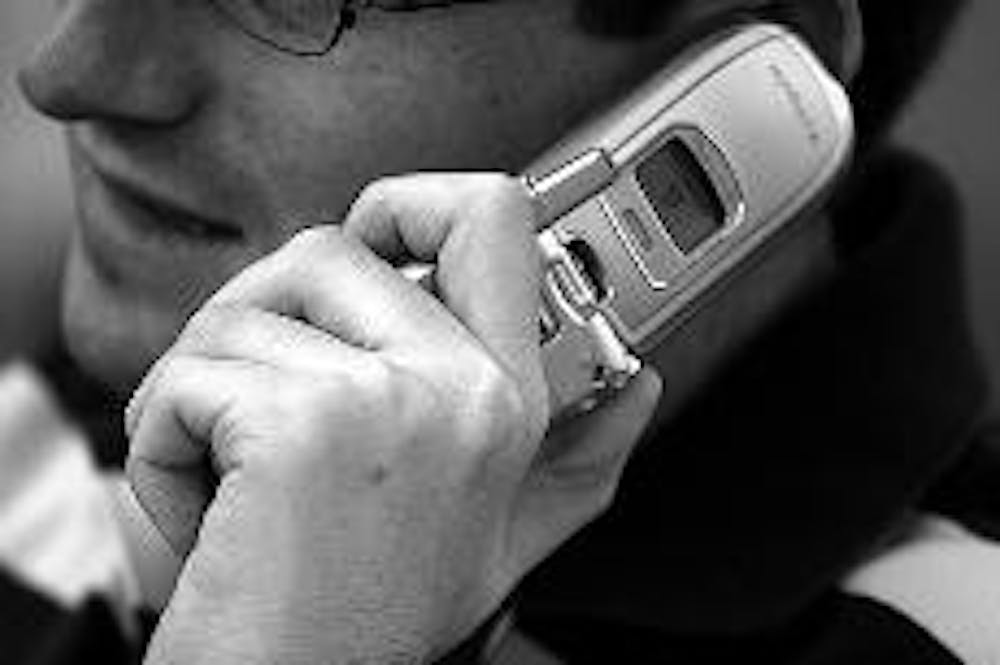Correction Appended
Maria Fufido dipped her hand in her backpack to grab her cell phone, but it wasn't there. She checked her coat; it wasn't there either. She started panicking, retracing her steps to all the places she had previously visited. Then, suddenly, she burst out in tears. Her cell phone was gone.
"I am completely lost without my cell phone," Fufido said.
Fufido, a freshman in the School of Communication, couldn't call anyone - even her best friend.
Fufido's cell phone contained many contact numbers, none of which she knew.
"I am from a tech-s avvy generation," she said. "There is no need for me to memorize anyone's phone number."
In this fast-paced world, people have grown accustomed to letting technology do all the work. People depend on technology to remember things for them so they can concentrate on other areas in their lives.
The cell phone is a necessity for Fufido because, like most students, she frequently has to balance an intense academic program with her athletic career and personal activities.
"I really don't have time to walk around with a pen and paper to write numbers," she said.
Fufido stores all the numbers of her family and friends in her cell phone. Once she enters a number, she never worries about memorizing it. She is confident the cell phone will do the job.
"When I enter a number into my cell phone's directory, I never go back to the number," Fufido said. "All I do is scroll to the person's name, press send and suddenly, they're on the other end of the phone, and that is cool."
Many users depend heavily on their cell phones to store and maintain data. When they lose their phone, they begin to panic. In the technological world, the symptoms are called "nomophobia" - the fear of being without mobile phone contact.
A recent study by YouGov, a United Kingdom organization, reveals that 53 percent of cell phone users surveyed experienced nomophobia.
The research found that more than 13 million British cell phone users feared being out of mobile phone contact. People get stressed out if the battery dies, if they can't get signal or, like Fufido, if they can't call anyone from a landline because they don't know any phone numbers.
Dr. Laura Juliano, a clinical psychologist and a College of Arts and Sciences professor, said people become dependent on technology because "we see it as reliable."
Juliano said people expect a reward when using their cell phones. When they do not get that reward, they become frustrated and agitated.
"We expect to have our cell phones at all times, and we expect them to work all the time," she said. "It means we are not prepared, and not being prepared creates that anxiety."
Juliano also said all technology is not 100 percent reliable.
"We must always work toward being prepared," she said. "This means taking the time to write numbers down, in a pocketbook perhaps."
Jennifer Arboleda, a senior in the School of International Service, said she remembered the days when she called herself a walking directory.
"There was a time when all I had was a pager," she said. "When I got a cell phone, I just got lazy in remembering numbers. I don't memorize the numbers because the cell phone does an amazing job at it. I know my house number and my dad's number, all the others I don't."
Benjamin Clapp, a senior in the CAS, backs up his numbers to his computer.
"The sad thing is, whenever I get a new cell phone, I always have to get the numbers from my computer," he said. "Technology somehow forces you not to depend on your long-term memory, and we seem OK with that."
It's a week later, and Fufido has bought a new cell phone. After having e-mailing all her family and friends for their numbers, she spent approximately 30 minutes entering phone numbers into the electronic directory, she said.
Despite her near-panic experience, Fufido said she still depends on the cell phone to memorize the numbers.
"I just keep on trusting the technology, forgetting the cell phone can get lost, stolen or broken," Fufido said. "One day, I will write the numbers down. That is, when I'm not too busy."
Correction: In "Students miss signals of cell addiction," Fufidio is the correct spelling of Maria's last name.





